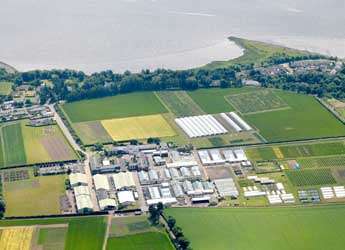

Instituto James Hutton
El Instituto James Hutton se formó en Abril de 2011 tras la fusión entre Macauly Land Use Research Institute (MLURI) y la Scottish Crop Research Institute (SCRI), para combinar sus fortalezas en el uso de la tierra y la investigación ambiental. La institución utiliza enfoques interdisciplinares para trabajar en asuntos globales clave tales como los alimentos, la energía y la seguridad medioambiental, y en enfoques tecnológicos y de gestión para tratar estas materias.
El JHI cuenta con más de 600 científicos y personal de apoyo provenientes de una gran variedad de disciplinas de ciencias sociales y naturales, convirtiéndola en uno de los mayores centros de investigación en Reino Unido. Su sede se basa en dos centros principales en Escocia (Aberdeen y Dundee) pero trabaja en proyectos en toda Escocia, Europa y también en muchos países en desarrollo. JHI pone gran énfasis en la relevancia de sus investigaciones a la hora de tomar decisiones a diferentes escalas y en diferentes sectores, desde los diseñadores de políticas medioambientales hasta los propietarios de las tierras. Es además experto en desarrollar efectivos puntos de contacto en prácticas de políticas científicas.
Por si te lo preguntabas, esta institución debe su nombre a James Hutton (1726 – 1797), quien fue una importante figura de la Ilustración Escocesa, una 'Época Dorada' del siglo XVIII llena de logros intelectuales y científicos, concentrados en Edimburgo. Se le considera internacionalmente como el fundador de la geología moderna y como uno de los primeros científicos en describir el planeta Tierra como un sistema vivo. Sus estudios en la selección natural fueron una influencia para Darwin a la hora de desarrollar su Teoría de la Evolución.
Juan Pablo is a Social and Cultural Anthropologist, graduated with Masters in Sustainable Rural Development and in International Cooperation and Project Management. His work experience is based on collaboration with various NGOs in the design of development projects for Ethiopia and Mali. Although he had already carried out a study on Decentralized Cooperation in Castile and Leon, his first research activity on the field was developed at the University of Aberdeen, where he has worked with participatory techniques in the management of national parks in Zambia. His MSc dissertation looked at the role of Public Participation in the management of National Parks. Currently he is assisting on the development of methodologies for participatory scenario building at the JHI, and helping with communication and relationships with partners in the case studies.
Iain is a senior scientist with 20 years' experience working on the interactions between land use and water resources with climate change, biodiversity and ecosystem services. He is particularly interested in further implementing ecosystem-based adaptation to enhance resilience for present and future change in a range of different environments including for multifunctional agricultural and forestry land uses. As part of the research he has been using a range of different tools, including scenario analysis, integrated assessment, multi-criteria assessment, land capability and risk assessment. Previously he has worked for the UK Climate Impacts Programme, Tyndall Centre for Climate Change Research, and University of Glamorgan. He has also acted as an advisor to the UK and Scottish Government.
Senior environmental economist , has an interdisciplinary background in environmental sciences and economics, with an emphasis on environmental valuation and a growing interest in qualitative analysis. Graduated as Doctor in the University of Cordoba (Spain), Julia joined the James Hutton Institute in September 2010, after a two years research stay in the Institute for Environmental Studies (IVM) of the VU University in Amsterdam and a postdoc in Spain. Her research focuses on the understanding of the relations of society and individuals with ecosystem services, with an specialization on water ecosystem services. Her work covers three main research lines: 1) Assessment of the impacts of changes in the ecosystem status on human welfare. 2) How can economic tools/principles be best applied to sustainable natural resources management?. and 3) How do global changes compromise the capacity of communities to use and enjoy ecosystem services and how these adapt to these changes?
Kerry is a researcher working in the Social, Economic and Geographical Sciences (SEGS) research group at the James Hutton Institute. Kerry has a background in both the natural and social sciences, some NGO experience, and field experience in several countries. She carries out interdisciplinary research that can inform and help improve policy and practice to conserve our environment and natural resources. She works using mixed methods across several projects, each relating to or more of a set of overlapping research interests: Community-based natural resource management; Scenarios for environmental decision-making; Ecosystem services, and the Ecosystem Approach as defined by the CBD; Stakeholder participation in environmental governance; Environmental policy, and science-policy interfaces for biodiversity and environmental management.
Kirsty has a background in Sociology, with a joint honours degree in Sociology with Gender Studies from Edinburgh University and a PhD in Sociology from James Cook University, Australia. She is the theme leader for our Society, Institutions and Governance sub-group of the Social, Economic and Geographical Sciences group at The James Hutton Institute. She is one of the of the initial cohort for the newly established Young Academy of Scotland. Her current research interest include: governance, particularly public and stakeholder participation in environmental policy making and implementation. She has an associated interest in the use of 'tools' as deliberative boundary objects in decision making and evaluation processes. She generally favours mixed qualitative methods such as interviews, focus groups and participant observation